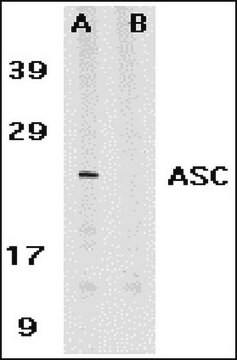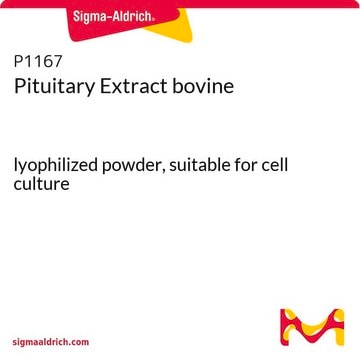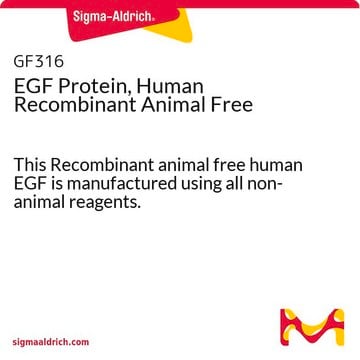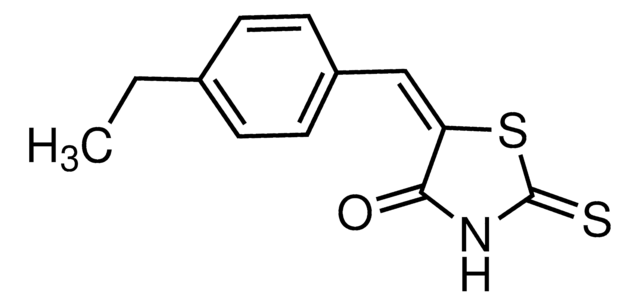04-147
抗-ASC抗体,克隆2EI-7
clone 2EI-7, from mouse
同義詞:
Caspase recruitment domain-containing protein 5, PYD and CARD domain containing, PYD and CARD domain-containing protein, Target of methylation-induced silencing 1, apoptosis-associated speck-like protein containing a CARD, caspase recruitment domain prot
登入查看組織和合約定價
全部照片(2)
About This Item
分類程式碼代碼:
12352203
eCl@ss:
32160702
NACRES:
NA.41
推薦產品
生物源
mouse
品質等級
抗體表格
purified antibody
抗體產品種類
primary antibodies
無性繁殖
2EI-7, monoclonal
物種活性
mouse
物種活性(以同源性預測)
human (based on 100% sequence homology)
技術
flow cytometry: suitable
western blot: suitable
同型
IgG1κ
NCBI登錄號
UniProt登錄號
運輸包裝
wet ice
目標翻譯後修改
unmodified
基因資訊
human ... PYCARD(29108)
相關類別
一般說明
凋亡受包含分子和蛋白酶的胱天蛋白酶家族的死亡结构域(DD)和/或胱天蛋白酶募集结构域(CARD)调节。含有细胞死亡调节剂的CARD包括RAIDD,RICK,Bcl10,Apaf-1,ARC,半胱天冬酶-2和半胱天冬酶-9。已经在人和小鼠中鉴定出一种新的含有CARD结构域的蛋白质,并将其命名为ASC和TMS1。ASC/TMS1的不规则表达通过激活半胱天冬酶-9诱导细胞凋亡,并抑制人乳腺癌细胞的存活。ASC/TMS1的过表达诱导DNA片段化。ASC/TMS1在多种人类和小鼠组织中表达。
特異性
该抗体可识别ASC。
免疫原
全长重组人ASC。
表位:未知
應用
使用该抗ASC抗体,克隆2EI-7检测ASC,已验证可用于WB、FC。
研究子类别
凋亡-附加
凋亡-附加
研究类别
炎症 & 免疫学
炎症 & 免疫学
品質
已通过蛋白质印迹在小鼠脾组织裂解液中进行了评估。
蛋白质印迹分析: 0.5 µg/mL的该抗体在小鼠脾组织裂解液中检测到ASC。
蛋白质印迹分析: 0.5 µg/mL的该抗体在小鼠脾组织裂解液中检测到ASC。
標靶描述
~22 kDa
外觀
形式:纯化
纯化的小鼠单克隆IgG1κ溶于含0.1 M Tris-甘氨酸(pH 7.4),150 mM NaCl和0.05%叠氮化钠的缓冲液中。
蛋白G纯化
儲存和穩定性
自收到之日起,在2-8°C条件下可稳定保存1年。
分析報告
对照
小鼠脾组织裂解液
小鼠脾组织裂解液
其他說明
浓度:请参考批次特异性浓缩物的分析证书。
免責聲明
除非我们的产品目录或产品附带的其他公司文档另有说明,否则我们的产品仅供研究使用,不得用于任何其他目的,包括但不限于未经授权的商业用途、体外诊断用途、离体或体内治疗用途或任何类型的消费或应用于人类或动物。
未找到適合的產品?
試用我們的產品選擇工具.
儲存類別代碼
12 - Non Combustible Liquids
水污染物質分類(WGK)
WGK 1
閃點(°F)
Not applicable
閃點(°C)
Not applicable
分析證明 (COA)
輸入產品批次/批號來搜索 分析證明 (COA)。在產品’s標籤上找到批次和批號,寫有 ‘Lot’或‘Batch’.。
Sung-Soo Jung et al.
American journal of physiology. Lung cellular and molecular physiology, 308(10), L1058-L1067 (2015-03-15)
Inflammasomes are cytosolic protein complexes that promote the cleavage of caspase-1, which leads to the maturation and secretion of proinflammatory cytokines, including interleukin-1β (IL-1β) and IL-18. Among the known inflammasomes, the nucleotide-binding domain, leucine-rich-containing family, pyrin domain-containing-3 (NLRP3)-dependent inflammasome is
Tiantian Tang et al.
Nature communications, 8(1), 202-202 (2017-08-06)
The NLRP3 inflammasome can sense different pathogens or danger signals, and has been reported to be involved in the development of many human diseases. Potassium efflux and mitochondrial damage are both reported to mediate NLRP3 inflammasome activation, but the underlying
Sonal Khare et al.
Nature immunology, 15(4), 343-353 (2014-02-18)
The innate immune system responds to infection and tissue damage by activating cytosolic sensory complexes called 'inflammasomes'. Cytosolic DNA is sensed by AIM2-like receptors (ALRs) during bacterial and viral infections and in autoimmune diseases. Subsequently, recruitment of the inflammasome adaptor
Wei Zhu et al.
Neuroscience, 343, 77-84 (2016-12-08)
Lipopolysaccharide (LPS) might affect the central nervous system by causing neuroinflammation, which subsequently leads to brain damage and dysfunction. In this study, we evaluated the role of nod-like receptor pyrin domain-containing protein 3 (NLRP3) inflammasome activation in long-term behavioral alterations
Chunqing Guo et al.
ACS chemical neuroscience, 8(10), 2194-2201 (2017-06-28)
In our efforts to develop novel small-molecule inhibitors for the NOD-like receptor family pyrin-domain-containing 3 (NLRP3) inflammasome as potential disease-modifying agents to treat neurological disorders including multiple sclerosis (MS), a hydroxyl sulfonamide analogue JC-171 has been rationally designed and biologically
我們的科學家團隊在所有研究領域都有豐富的經驗,包括生命科學、材料科學、化學合成、色譜、分析等.
聯絡技術服務


